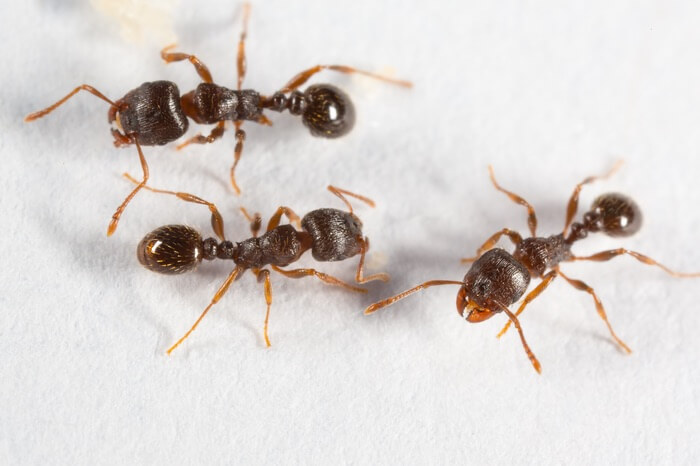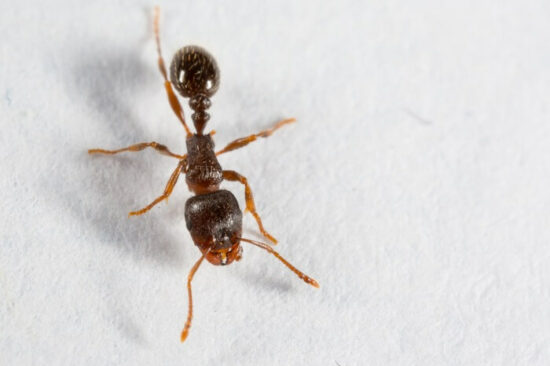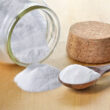Many homeowners get a bit stumped when they try to learn how to get rid of pavement ants. These pests are notoriously stubborn and tough to kill completely, plus there are so many potential methods to try!
In this guide we’ll teach you how to get rid of pavement ants (with chemicals and naturally). It will make you an expert when it comes to this pesky insect, and give you the tools you need to get them out of your home for good.
Table of contents
What Do Pavement Ants Look Like?
Pavement ants (sometimes called concrete ants) are one of several home-invading ant species. While all ants look pretty similar, pavement ants have several distinct features that set them apart.
Color and size are the simplest ways to identify them. These insects usually have dark brown or black bodies. Some rare subspecies are rust-colored, but they’re still pretty dark and easy to differentiate from other red ants.
Whatever the case may be, pavement ants always have lighter-colored legs and antennae.

As for size, pavement ants are on the smaller side. Mature adult workers are only two or three millimeters long. Swarmer ants, which are responsible for reproduction, can be twice as big as that. The swarmers also have wings, which makes them easier to spot.
- Kills common household ants including acrobat, crazy, ghost, little black, odorous house, pavement, and other sweet-eating ants
- As worker ants discover the bait, they share it with the rest of the colony to eliminate them all
- You should see a significant decrease in the number of ants visiting the bait stations within just a few days
- Place stations near areas where you’ve seen ant activity
If you look closely, you’ll notice a few unique physical traits as well. These features are difficult to see on an ant that’s fleeing. But if you observe them under a magnifying glass, these differences become glaringly obvious!
First, pavement ants have a segmented petiole, which is the small piece that connects the thorax to the abdomen. The petiole has two distinct nodes.
On the thorax and head, these ants are sporting several parallel lines. They look like tiny little grooves that run across the head and mid-section. The abdomen lacks lines, which only makes them stand out more.
Quick Tip: Pavement ants also have a tiny stinger on their oval-shaped abdomen. The ants can use the stinger for defense, but it’s far too small to cause any significant pain.
Where To Find Them
Pavement ants are appropriately named for their love of concrete. Outside, they like to create colonies underneath paved surfaces. Whether that’s a sidewalk, a driveway, or even a home’s foundation, they’ll find a way to get under it!
The ants will often slip into the concrete cracks to meander their way through homes and businesses. Oftentimes, you can see the nest’s entry point as a small pile of dirt between surface slabs. For example, the mounds tend to appear in sidewalk expansion joints.
While most pavement ants live outside, they can enter (and live in) buildings. This makes getting rid of pavement ants a bit tricky, but this behavior isn’t anything out of the ordinary. Like any other ant species, these insects are attracted to food, moisture, and warmth.
Pavement ants eat a wide range of foods. They aren’t like other ants that only stick to one flavor profile! Instead, the pest will consume sweets, proteins, grease, and anything else they can find.
Generally, pavement ants enter homes through cracks in the foundation or underneath door jams. After that, they look for places to nest and reproduce.
High-humidity areas around kitchens and bathrooms are the go-to (take a close look at the kitchen sink). They like to stay close to sinks or leaking pipes for a constant supply of water.
You may also find them living within walls. Insulation and hot water pipes provide the warmth they need to survive.
Quick Tip: Here’s a guide that goes over how to get rid of ants in walls.
Of course, pavement ants will also appear around exterior doors and anywhere that’s close to food. The kitchen is the most common place to find ants, but they’ll also show up in any other rooms you eat in.
How To Get Rid Of Pavement Ants
When it comes to getting rid of pavement ants, these insects can be quite frustrating. Resilient and quick to reproduce, it doesn’t take long for infestations to reach massive numbers.
The good news is that there are several ways to kill and get rid of them once and for all. Here are a couple of proven techniques used by professionals and homeowners alike.
Commercial Bait Traps
You can’t go wrong with bait-style traps.
- Kills common household ants including acrobat, crazy, ghost, little black, odorous house, pavement, and other sweet-eating ants
- As worker ants discover the bait, they share it with the rest of the colony to eliminate them all
- You should see a significant decrease in the number of ants visiting the bait stations within just a few days
- Place stations near areas where you’ve seen ant activity
Ant traps use the pavement ant’s insatiable appetite and gargantuan workforce against it. You see, bait traps rely on slow-acting poison to eliminate a colony.
Instead of killing pavement ants on contact, the poison works over two days. By that point, the bait has already spread throughout the colony.
The poison is cleverly disguised as food. Usually, you have to pair the bait with the ant. But because pavement ants eat protein-based foods, sweet foods, and grease, they will have no problem taking most baits.
After scout ants find and sample the bait, they’ll call in reinforcement to bring as much of it back as possible. Pavement ants work fast and have a reliable workforce to collect bait and poison the entire colony.
If you’re lucky, the poison will make its way to the queen. Once she dies, the rest of the nest will soon follow and you’ll have successfully gotten rid of the pavement ants.
Commercial bait traps for pavement ants are available everywhere. You can get them in liquid or gel form. Some also have premade boxes to keep the bait well-protected.
Quick Tip: As always, make sure to exercise caution when placing them around the house! Keep the traps away from children and pets.
Chemical Insecticides
Chemical insecticides work wonders on visible ants. They work instantly, so you’re not going to have the same long-term impact as bait products. But, insecticides will do the job and kill pavement ants quickly.
Insecticide sprays and powders utilize a wide range of chemicals. Some of the most common active ingredients are hydramethylnon, fipronil, and avermectin.
Simply apply the spray directly onto ants and mounds that you find. You can also spray the product into any cracks or crevices you see. Many ant exterminators will treat baseboards and wall corners to be on the safe side.
It doesn’t take long for the insecticide to kill pavement ants. Upon contact, it can clog breathing holes and take over the nervous system.
Insecticides come with their risks (especially when used indoors). Obviously, you have to be very careful about inhalation and accidental ingestion. Clear the home and wear protective gear when handling dangerous chemicals.
Quick Tip: It’s also a good idea to keep the space well ventilated and wait several hours for the chemicals to dissipate before entering.
DIY Borax Bait
If you want to get rid of pavement ants and don’t mind doing some extra work, you can make your own DIY ant bait!
Borax powder is the main ingredient here. It’s a chemical compound that’s found in cleaning agents and tons of household products. When you’re at your local grocery store, pick up a box of borax powder!
Then, mix it up with some peanut butter to create a thick paste. You can also utilize powdered sugar, baking soda, and any other food ingredient the ants will eat.
Place the bait near known trails and entry points. Homeowners have been killing ants with borax for quite some time, and it works just as well as most of the commercial chemical poisons out there.
How To Get Rid Of Pavement Ants Naturally
Not ready to use harsh chemicals? We don’t blame you!
With all the risks involved, many homeowners prefer turning to natural alternatives instead. Here’s how to get rid of pavement ants naturally by using safe ingredients you already have around the home.
Soap & Water Spray
Believe it or not, soap can be used to kill pavement ants. Standard dish soap is a surfactant. That means upon contact, it will start to dissolve the waxy layer on the shell. Not only that, but it also gets into the insect’s breathing tubes and prevents them from using surface tension to avoid drowning.
Soap causes suffocation to kill pavement ants without all of the harmful side effects of harsh chemicals.
To create your homemade ant spray, just mix about half a cup of dish soap into one cup of water. Mix everything until the soap is fully incorporated, pop it into a spray bottle, and you’re good to go.
Vinegar Solution
Vinegar is an excellent catch-all to have in your home. It serves a few different roles if you’re trying to get rid of pavement ants.
First, vinegar is an all-natural repellent. Many insects cannot stand the aroma of acidic vinegar. As a result, they avoid it as much as possible!
Secondly, vinegar eliminates scent pheromones. You see, ants leave behind scent trails that other workers use to find them. Once they find a good food source, other ants use the trails to create an assembly line back to the nest.
When you eliminate that trail, you can get rid of pavement ants by essentially causing them to become lost! They can’t find their way home and eventually die without resources to survive.
Finally, vinegar can be a suitable contact killer. While not as effective as harsh chemicals, it can drown ants nonetheless. Plus, the acidity dissolves that protective coating a bit to cause physical harm.
Quick Tip: Want to add vinegar to your ant-killing arsenal? Create a solution of equal parts water and vinegar. You can use standard white vinegar or apple cider vinegar. Both work well.
All-Natural Repellents
We’ve already talked about how you can get rid of pavement ants with vinegar. But, it’s not the only thing in your home that’ll keep these pests out!
Most herbs and spices with a strong aroma will do the trick. While welcoming to us, the smell of herbs is overwhelming to ants. It’s enough to turn them away to prevent nesting and population spread.
Some of the more commonly utilized herbs and spices include:
- Rosemary
- Citrus
- Lavender
- Turmeric
- Mint
- Cayenne Pepper
- Marigold
- Cloves
- Citronell
- Bay leaves
- Cinnamon
Even coffee grounds work well.
Now, you can use these herbs in many different ways. If you’re using items you found in your pantry, sprinkle the herbs around potential entry points. Use it to stuff cracks and pour some around your doorways to create an invisible barrier of smells!
If you have access to essential oils, you can also make a spray! Apply it to all the same points for similar benefits.
Diatomaceous Earth
Diatomaceous earth is another all-natural product that homeowners use to get rid of pavement ants. It’s an organic powdered product that you can usually find in garden centers and big-box stores.
The powder is made of the fossilized remains of diatoms. Manufacturers crush the remains into a fine powder that’s easy to spread and handle. To us humans, the powder is pretty safe. There are some risks with inhalation, but it’s considered a safe product by most standards.
However, it’s lethal to pavement ants and other hard-bodied insects. When the powder falls onto the body of an ant, it immediately causes microscopic injuries. Eventually, the ant bleeds out and loses all body fluids. In other words, it dehydrates the pavement ants until they die!
Quick Tip: Simply sprinkle this anywhere you see these insects. It’s especially good for cracks in the driveway.
Prevention Tips
Pavement ants are pretty widespread, so there’s always a risk that they can come back. Don’t rest on your laurels and assume that you’ve gotten rid of them completely!
To prevent future invasions, you must be proactive.
The first thing you should do is seal all entry points. Use some concrete filler to patch any cracks and crevices in your foundation or exterior walls. For voids around windows and doors, consider using some color-matched caulk.
After that, you should remove any potential attractants around your home. That means moving piles of brick or broken concrete slabs. If you have plants around your home’s perimeter, keep them prunes and well-maintained.
Quick Tip: We also recommend leaving about a foot of empty space around the exterior walls. Clean up any brush or mulch to ensure that nothing becomes a haven for these ants.
Finally, you can use some home-defense products to deter pavement ants. These products require regular applications, but they work well to keep ants and other pests away. If you prefer a more natural approach, the essential oil and vinegar sprays we went over earlier will work as well.
Even after you’ve taken some preventive measures, it’s important to clean regularly. Clean up messes and vacuum your floors regularly. Doing so will remove any food crumbs and potential attractants.
It’s also good to have your home inspected by a pest control professional if you think you need some extra help. Not only will they spot signs of a potential infestation, but they can identify problems before more pavement ants come.
Can They Cause Any Damage?
Pavement ants are more of a nuisance than anything else. They’re pretty harmless as far as damage goes.
Larger colonies can potentially cause some trouble around foundations. A big enough nest could impact the structural integrity of the soil below your home, which could spell trouble.
Luckily, infestations are usually dealt with before they reach that stage. It also needs to be a pretty big infestation for this to be a serious concern.
Interestingly enough, one of the worst things you have to worry about with pavement ants is the possible spread of disease. These insects will crawl in rotting food, which could transfer bacteria into your home. They’re capable of carrying disease, so it’s important to address home invasions as soon as possible.
Final Thoughts
Now that you know how to get rid of pavement ants, there’s nothing stopping you from killing these pests and reclaiming your home. No matter where these insects are or how serious the infestation is, the methods above (even the natural ones) will help you put a serious dent in their population.
If you have any other questions about these ants we’re more than happy to chat with you. Giving tips and feedback to our readers is all part of the fun!



